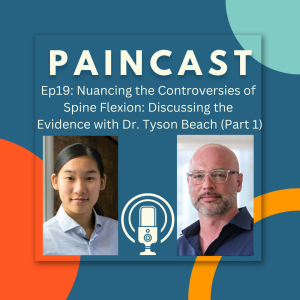

Ep19: Nuancing the Controversies of Spine Flexion: Discussing the Evidence with Dr. Tyson Beach (Part 1)
Dr. Tyson Beach is currently a teaching professor at the University of Waterloo, teaching courses on the biomechanics and assessment of human movement, exercise prescription, and low-back disorders. His previous research focused on quantitative motion analyses, prevention of work-related musculoskeletal disorders, and advancing fundamental knowledge of spinal mechanics, control, and injury causation. He also collaborates with other knowledge producers (researchers) and users (practitioners) to design, implement, and evaluate physical activity and exercise programs for workers and athletes.
In this episode, we discussed the epidemiological and biomechanical literature around lifting with spinal flexion. Acknowledging that biomechanics is only one of the many factors in low back disorders, the goal of the discussion is to highlight the nuances in understanding biomechanics literature rather than to provide a definitive answer to this topic.
Relevant articles (Part 1)
- Saraceni, N., et al. (2020). To flex or not to flex? Is there a relationship between lumbar spine flexion during lifting and low back pain? A systematic review with meta-analysis. JOSPT, 50(3), 121-130.
- Nelson, N. A., et al.. (2009). Quantifying relationships between selected work-related risk factors and back pain: a systematic review of objective biomechanical measures and cost-related health outcomes. Int. J. Ind. Ergon., 39(1), 202-210.
- Wells, R., Van Eerd, D., & Hägg, G. (2004). Mechanical exposure concepts using force as the agent. Scand J Work Environ Health, 179-190.
- Impellizzeri, F. M.,et al. (2023). Understanding training load as exposure and dose. Sports Med, 1-13.
- Kalkhoven, J. T., et al. (2020). A conceptual model and detailed framework for stress-related, strain-related, and overuse athletic injury. J Sci Med Sport, 23(8), 726-734.
- Callaghan, J. P., et al. (2001). Intervertebral disc herniation: studies on a porcine model exposed to highly repetitive flexion/extension motion with compressive force. Clin Biomech, 16(1), 28-37.
- Gunning, J.L., et al. (2001). Spinal posture and prior loading history modulate the compressive strength and type of failure in the spine: a biomechanical study using a porcine cervical spine model. Clin Biomech, 16(6): 471 480.
- Gooyers, C. E., et al. (2015). Exploring interactions between force, repetition and posture on intervertebral disc height loss and bulging in isolated porcine cervical functional spinal units from sub-acute-failure magnitudes of cyclic compressive loading. J Biomech, 48(13), 3701-3708.
Discussion flow
(00:01:35) Introduction
(00:04:53) High-level summary of the flexion discussion
(00:06:40) Discussion on the epidemiological evidence: Issues with measuring exposure
(00:10:05) Discussion on the epidemiological evidence: Measurement of spine motion
(00:12:55) Discussion on the epidemiological evidence: Reporting absolute vs normalized spine motion
(00:16:03) The kinematic of flexion needs to be nuanced by the corresponding kinetic information and load distributions
(00:17:50) The challenging nature of epidemiological work
(00:20:12) Summarizing the epidemiological discussion
(00:23:23) The necessity to contextualize "flexion"
(00:24:56) Evidence from the ergonomic literature
(00:26:58) Evidence from tissue biomechanics
(00:29:43) Criticisms of evidence from tissue biomechanics
(00:30:51) Caveat with using tissue disruption studies to understand low back pain
(00:33:41) Nuancing tissue loading and adaptation
(00:34:58) Short summary of discussion on the tissue biomechanics literature
(00:36:06) Addressing the argument of facilitating tissue adaptation by progressively overloading spinal flexion
Paincast is dedicated to bringing together researchers, clinicians, and students to discuss topics related to pain and physiotherapy. The primary purpose is to facilitate knowledge translation and critical thinking. Some episode posit themselves as more educational than others, and some more opinionated than others. The listener is encouraged to critically reflect on the content. While there is an effort to incorporate research evidence, and the topic is researched by the host (Tiffany), we recognize there is room for improvement and there is expertise in the community. As such, we invite constructive critique and that you inform us of any inadvertent errors, so that we may correct them. You may submit your feedback through this form: https://forms.gle/UFfbUHBh8uKwSKgS8
More Episodes
All Episodes>>You may also like
Create Your Podcast In Minutes
- Full-featured podcast site
- Unlimited storage and bandwidth
- Comprehensive podcast stats
- Distribute to Apple Podcasts, Spotify, and more
- Make money with your podcast












